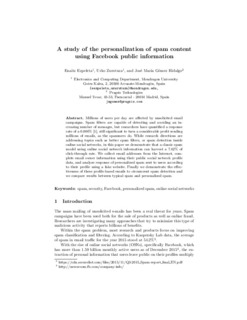
Title
A study of the personalization of spam content using Facebook public informationAuthor (from another institution)
Publication Date
2017Version
PostprintDocument type
Journal ArticleJournal ArticleLanguage
EnglishRights
© The Author 2016. Published by Oxford University Press. All rights reserved. For Permissions, please email: journals.permissions@oup.comAccess
Open accessPublisher’s version
http://dx.doi.org/10.1093/jigpal/jzw040Published at
Logic Journal of the IGPL Vol. 25. Nº. Pp. 30–41. 1 February, 2017Publisher
Oxford University PressKeywords
spam
security
Facebook
personalized spam ... [+]
security
personalized spam ... [+]
spam
security
Facebook
personalized spam
online social networks [-]
security
personalized spam
online social networks [-]
Abstract
Millions of users per day are affected by unsolicited email campaigns. Spam filters are capable of detecting and avoiding an increasing number of messages, but researchers have quantified a response r ... [+]
Millions of users per day are affected by unsolicited email campaigns. Spam filters are capable of detecting and avoiding an increasing number of messages, but researchers have quantified a response rate of a 0.006% [1], still significant to turn a considerable profit sending millions of emails, as the spammers do. While research directions are addressing topics such as better spam filters, or spam detection inside online social networks, in this paper we demonstrate that a classic spam model using online social network information can harvest a 7.62% of click-through rate. We collect email addresses from the Internet, complete email owner information using their public social network profile data, and analyze response of personalized spam sent to users according to their profile using a fake website. Finally we demonstrate the effectiveness of these profile-based emails to circumvent spam detection and we compare results between typical spam and personalized spam. [-]
xmlui.dri2xhtml.METS-1.0.item-sponsorship
Gobierno Vascoxmlui.dri2xhtml.METS-1.0.item-projectID
GV/Proyectos de Investigación Básica y Aplicada 2014-2016/PC2014-08/CAPV/Seguimiento y filtrado de spam personalizado en medios sociales mediante modelos de difusión y análisis del contenido/SOCIALSPAMCollections
- Articles - Engineering [763]




















